- Home
- Gary Corby
Death on Delos Page 4
Death on Delos Read online
Page 4
“What did you say?” I said.
“That you’re like me.”
He spoke in a friendly, casual voice, but I was startled at his words. Was he saying that he was an agent? Had he spotted me for one? If so, how?
“What do you mean?” I asked cautiously.
“I mean you like to stand to the side and watch things happen,” said the tall blond man. “I’ve been watching you, while you watched everyone else. You’re not like the other Athenians. They think too much.”
“Is that bad?” I asked.
“People who think a lot get themselves into trouble,” he explained. “But you don’t! You stand apart and you work with your eyes all the time. Would you like some dinner?”
He held out a piece of flat bread, into which had been stuffed onions fried in olive oil, with slivers of succulent lamb. I dislike onions but love lamb. I took the food from his hand gratefully.
“What’s your name?” I asked him.
“Damon. I’m one of the villagers.”
“Not one of the priests?” I asked. “Don’t they come from the village too?”
He shook his head. “Not really. All the priests and priestesses come from other cities. They moved here to serve the Gods.” He paused. “Except for our girl Meren,” he added. “She’s the only local to become a priestess. We’re all real proud of her. The rest of us aren’t that smart.” He laughed. “Someone has to do the real work around here. That’s me and my fellows.”
“I’m Nico,” I said. I transferred the bread to my left hand and offered my right. We shook hands. “Thank you for the food. I wish I could offer you something in return.”
“Don’t worry about it.” He shrugged. “Let’s just talk.”
“What about?” I asked.
“How come you’re interested in Geros?”
I almost choked on my lamb. “He’s an interesting man,” I managed to say, after Damon had slapped me on the back and I’d recovered my breath. “Is he the one really in charge?”
“Instead of Anaxinos?” Damon shook his head. “Geros is like one of those irritating grandmothers who refuse to die.” He nudged me with an elbow. “You know the type?”
“I’m not sure . . .”
“The type that hang around forever and demand everything in a querulous voice. They make life miserable for the lady of the house, and they think everything has to be arranged for their convenience. But no one says anything against the old biddy, because she’s the master’s mother, and you’ve got to respect the aged, right?”
Damon stopped speaking. He was obviously waiting for me to agree.
All my grandparents had died when I was young, but I’d been to the home of friends who had exactly that sort of lady. She was usually to be found sitting in the courtyard with her gouty feet up on the best dining couch, shouting orders at all and sundry.
“I know what you mean,” I said to Damon. “What makes Geros so respected that people obey him?”
“He’s been on the island since Zeus was a boy. He knows more about the traditions of Delos than all the other priests combined. If you need to know the right ritual for some obscure event, then Geros is your man.”
“How come he isn’t the High Priest?” I asked, in between mouthfuls of dinner.
Damon shrugged. “It was before my time, but I think he got passed over. Well, you can see why.”
I could. Geros was divisive. Anaxinos was a consensus man. Any committee would take Anaxinos over Geros.
“But Geros seems to be uncontrollable,” I said.
“You got that right,” Damon said with feeling.
“Anaxinos can’t like that too much,” I said.
“He doesn’t.” Damon laughed. “He never says anything in public, but you can tell. When Geros throws one of his tantrums, Anaxinos stands to the side with that false smile on his face and he waits for Geros to calm down. Then Anaxinos carries on as if nothing had happened.”
“Like what’s happening now,” I said.
“Yeah, but this is a bigger tantrum than usual. This time the old priest has got everyone stirred up, and Anaxinos is doing what he always does: standing to the side and waiting for it to pass. Don’t know if it’s gonna work this time, though. You gonna stay out here all night?”
“Maybe.”
“Well, I gotta go. Been a long day.” He wiped his greasy hands on his tunic, leaving streaks of olive oil and lamb fat smeared across the fabric. This told me that Damon wasn’t married, because no wife would have forgiven him (as I had discovered the hard way).
As he turned to go, Damon said, “The funny thing about that sort of grandmother is, after they die, everyone’s kind of relieved, but no one’s brave enough to say it.”
The strange villager wandered off into the night.
The Offer
The men of Delos and Athens sat about the sanctuary. They kept warm by the dying fires and drank wine from skins that they passed among them. The women for the most part trailed back to the village, in twos and threes, yawning a great deal and telling their men not to stay out too long, and not to wake them when they returned home drunk at dawn.
The High Priest Anaxinos looked about him. He was still surrounded by his small group of loyal acolytes. One of the middle-grade priests said something, to which Anaxinos nodded. As a group they began the walk down the Sacred Way, the wide path leading in and out of the sanctuary grounds. Their route took them past where I stood on the steps of the Oikos.
Anaxinos stopped and looked up at me in a rather curious way. “Where is your wife?”
“At home, sir, or rather, in the fine cottage you lent us.”
“It’s late, you should join her.”
“Yes, sir.”
Anaxinos began to walk on, then suddenly asked, “Is all well with you?” He was ever the perfect host.
“Very well, sir,” I said. “Thank you for asking.”
“Good night, then.” He walked on, and his gaggle of priests followed. The moon, which was three-quarters full, had shone bright upon the protestors. Now clouds came to cover Selene, goddess of the moon. It made little difference to the drinkers—they had their fires—but the surrounding darkness gave the scene a sinister air.
It seemed that the old priest Geros had only been waiting for Anaxinos to depart, for he soon took leave of his own followers. But he didn’t walk south toward the village. Geros turned due north, the opposite direction. What surprised me was that he walked away without any friends to accompany him.
I knew this was my chance. I couldn’t imagine catching the old priest alone at any other time.
I watched Geros walk quickly into the darkness beyond the fires, and I was suddenly gripped by a fear that he might disappear into the night before I could catch up with him. I would be distraught if after such a long wait I missed my chance. I jumped down from the steps and hurried to follow.
I needed to skirt the barbeque pits—it would certainly look strange if I, an Athenian, was seen hurrying after the leader of the anti-Athenian protestors. Someone might even stop me. So I had to go around the fires, but should I circuit to the left or to the right?
I circled to the right. The ground beneath my feet was hard and easy to walk on, and luckily there were no loose stones, because in the dark I might easily have twisted an ankle. I had to wait a moment for my eyes to adjust, because the bright fires had blinded me.
As vision returned, I realized that Geros was nowhere to be seen. I cursed silently and hurried forward in the hope that I might catch a hint of his movement.
Without any warning my right foot slammed into stone. I was wearing sandals, but that wasn’t enough to save my toes. I felt the toes crunch and the pain was immediate. I stifled my cry, but the surprise made me fall forward. My left knee hit the same rocks. I put out a hand to stop total collapse, and discovered t
hat my assailant was a low stone wall, invisible at night unless you knew to look down. I cursed my luck.
The wall was too low to be useful for any practical purpose except to sit on it, which I did. I crossed my right foot over my aching left knee and rubbed the damaged toes. I would have to hope they weren’t broken.
I guessed the wall must be the boundary marker for the sanctuary. Most sanctuaries have them, but this one was remarkably close by. The wall gave me an idea. Geros hadn’t walked in my direction; if he had he would certainly have heard my accident. But he obviously knew where the wall was; he wouldn’t have come this way intending to climb over it. Therefore I guessed that I would find a gate if I walked in the opposite direction. Now I knew which way I must go. When I passed the fires I had turned to the east. Now I headed west.
I had to hop to avoid putting pressure on my sore toes, then discovered that I also had to favor my left knee. It was a good thing it was dark, because my gait probably resembled one of those strange monkey creatures that the Egyptians keep for their amusement. I continued in this way with some caution, and was rewarded when I came to the corner of the sanctuary. I managed to avoid running into the adjoining wall. Here I found the gate I’d been looking for. It was the only way out unless Geros had climbed the wall in the dark, which seemed less than likely for a man of his dignity.
The pain in my foot and knee had subsided to a throb. I went through the exit to discover that I had walked into a graveyard.
It wasn’t the sort of destination I’d been expecting. I knew it was a graveyard because of the funeral stele, stones erected to commemorate the dead. Some stood as tall as me, so that their silhouettes were discernible against the night sky. Two were close enough that I could run my hand over the inscriptions. The carved stone was gritty to my touch with sea salt, but even so I could read off the letters by feel. This made me stop and think.
Had Geros truly walked into a graveyard in the dead of night? If so, why? I could think of several explanations, but every one of them was macabre.
Still, the man was nowhere to be seen, and I was beginning to worry, for I was sure that I was approaching the coast. Delos was not so large that you could walk in a straight line in any direction for long without stepping into the sea.
I had to acknowledge that I had failed. Perhaps I would be able to catch Geros in the morning, when it was light and I could at least see the man I was attempting to bribe, though how I would corner him discreetly I couldn’t imagine.
My attention was caught by a flicker of light in the distance. I realized it must be a torch. Whoever held the light seemed to be waving it about. It couldn’t be Geros, who had left the bonfire without a torch. My immediate thought was that it might be sailors from one of the Athenian ships. But the navy had beached south of the dock, and we were north. Perhaps it was a sailor who had become lost.
No matter, it was someone with a light by which to see, and I was close to becoming lost myself. I decided to ask for directions back to the village. I made my way toward the light—with caution, for I had already learned one object lesson this night about the pitfalls of hurrying across unknown terrain.
So it was that I was staring at the ground, looking to see where I put my feet, when I ran straight into Geros. I almost knocked him over. He stumbled backwards.
“Look where you’re going, you oaf!”
“What?” I said, then realized who I had hit. I felt I should explain. “I’m sorry, sir, I didn’t see you in the dark. I was heading toward that light over there.” I pointed, but the torchlight had gone. “That is, there was a light over there, but it’s gone now.”
“Are you a moth, to be attracted by lights?” he asked.
“No, sir. I wanted to ask directions.”
“Got lost, did you?”
“Actually, sir, I was looking for you.”
The clouds that had covered the moon chose that moment to depart, revealing holy Selene in all her glory. The old priest peered at me.
“You’re the husband of that priestess the Athenians sent.”
“Yes, sir.”
“I don’t know why you bothered coming to this island. You arrived with one small treasure, and then instantly tried to remove a far greater one. Hypocritical, don’t you think?”
He had given me the opening I needed. I said, “That’s what I’d like to speak to you about, sir.”
“Yes?” He looked at me expectantly.
Now that I’d found Geros, I discovered that my voice had dried up. Pericles had told me what to say when I met the priest, how to make the transaction sound perfectly good and normal. But every word that Pericles had said had fled my mind. My tongue was paralyzed.
Geros glared at me. “Well, what is it? Speak up.”
I stammered. “I . . . er . . . I mean, we . . . that is, Athens . . .”
Geros stamped his staff on the ground in annoyance.
“We’d like to pay you to withdraw your objection to Athens’s taking the treasury of the Delian League,” I blurted out, and winced at my bluntness.
Geros stared at me, in obvious complete surprise. I don’t know what he’d been expecting me to say, but it wasn’t this.
“You are offering me money to betray the Gods?” he said.
“Pericles also suggested wine and women, if money didn’t suit,” I said quickly. “I’ll tell him you’re not interested, shall I?”
Geros paused for a moment. Then he asked, “How much money?”
I was shocked. I think my jaw dropped. I had expected Geros to curse me and tell me to go away. I wouldn’t have blamed the priest if he had struck me with his staff. Instead, he had opened negotiations.
“Umm, I confess I don’t know,” I said, because Pericles had never suggested a sum. “But I’m sure it would be a lot of money.” That sounded lame, even to my ears. Desperate to put a more professional spin on my bribery, I decided to add, “Do you have any suggestions, sir?”
Geros rubbed his chin. “The Delian Treasury is the largest in all of Hellas,” he said thoughtfully.
“Yes,” I agreed. Everyone knew that.
“For such a treasure I think the offer should be not less than thirty talents,” Geros said.
I tried not to gasp. You could buy a silver mine with thirty talents, and have change left over for a country estate.
“That is a lot of money,” I told Geros. “It might be too much.”
“You think I would help Athens for the price of a dinner?” Geros asked. He sounded offended.
“No, sir!” I said. “I merely hadn’t thought about it.”
“For a negotiator, you come strangely unprepared,” Geros said. “Are you sure you represent Pericles?”
“I promise that I do. But the fact is, sir, I must consult my principal as to whether he would be willing to pay so much money.”
“Then do so. I shall expect to see you later, with more details,” Geros replied.
“How shall I approach you?” I asked.
“On the other side of this field are some abandoned houses. You will find me there after dawn. I assume Pericles can come to a decision very quickly. Until that time, this conversation never happened.”
“Pericles will be swift in his reply, sir, but do you want time to reconsider this?” I asked.
“What do you mean?” Geros asked.
“I mean, are you sure?” Then I realized I was trying to talk the priest out of accepting my own offer. “That is, this is a very big step you’re considering.”
“Are you trying to back out of the deal?” Geros said suspiciously.
“No, sir!” I said quickly. Although, in fact, I had been trying to do exactly that.
Geros stamped his staff on the ground—it seemed to be his favorite way of starting and ending any conversation—then he marched off into the night. This time he walked towards
the village.
I could hardly believe what I had heard. This man had spent the entire day preventing Athens from getting anywhere near that treasury. I had thought he was willing to defend it with his life. Now he was willing to sell it out?
The turnaround seemed so complete that I wondered if this was some sort of elaborate trap. But if so, I couldn’t see how. He could not have known about my offer in advance.
This left only the apparently indisputable discovery that the old priest was as greedy as every other man in Hellas. That thought somehow depressed me. I had wanted to think Geros was an honest man, even if he was a highly dogmatic pain in the ass.
THE ACCEPTANCE
“I accept,” Pericles said instantly, when I told him what had happened.
I had returned to where the boats were beached upon the sands. Pericles would normally have rated accommodation in the village, but the Delians did not have a spare cottage in which to house him. The official visitors’ residence was already occupied by Diotima and me, and though I could easily be tossed out to make way for the foremost man of Athens, the same could not be said of a pregnant priestess, nor was Pericles so foolish as to even suggest such a thing. I took delight in knowing that my bed was better than his—not that I’d had a chance to use it.
In any case, Pericles had brought with him his General’s tent. Pericles was renowned across Hellas as a statesman, but this was a misconception. All ten of our military Generals owned massive campaign tents, which served as headquarters when at war, and in which they slept. Thus Pericles had set up home on Delos in canvas quarters that were almost palatial.
I had to argue with the guard at the entrance to force him to wake our commander. The common men had no idea what mission I was on, and I was not about to enlighten them.
Pericles was usually the height of perfectly dressed fashion, but after the guard shook him awake, Pericles staggered to the tent’s entrance, bleary-eyed and with his hair unkempt. I had never seen him look so completely like a normal man.
He took one look at me and said, “Come in.”

 The Singer from Memphis
The Singer from Memphis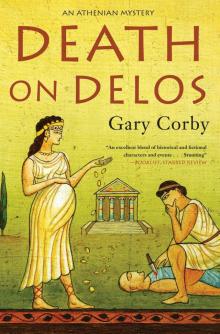 Death on Delos
Death on Delos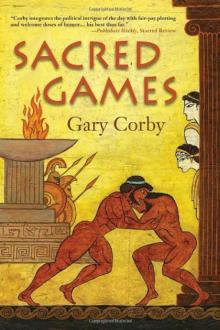 Sacred Games
Sacred Games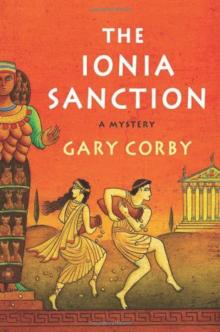 The Ionia Sanction
The Ionia Sanction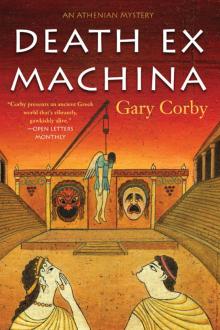 Death Ex Machina
Death Ex Machina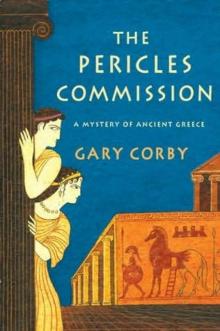 The Pericles Commission
The Pericles Commission